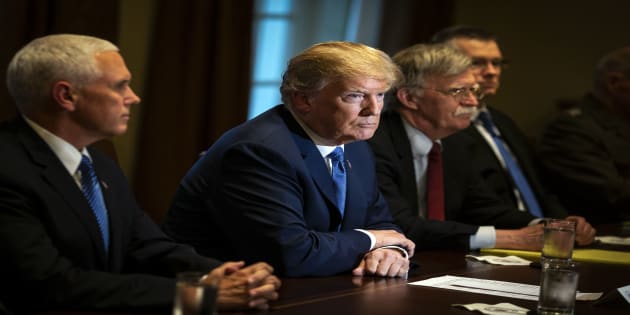
President Donald Trump announced on Friday evening that the United States and its allies Britain and France had launched airstrikes on Syria in response to a suspected chemical attack that killed dozens on Saturday.
— Donald J. Trump (@realDonaldTrump) April 14, 2018
Earlier this week, Trump had raged against Syria and the regime of President Bashar Assad. On Wednesday, Trump suggested that missiles aimed at Syria “will be coming.”
Here’s what you need to know about the reported atrocity.
What happened?
More than 40 Syrians, including men, women and children, choked to death after a suspected chemical attack in the city of Douma on Saturday. Some of the victims were discovered with foam coming out of their mouths, huddled in homes that reeked of chlorine.
At least 500 others were treated for symptoms “consistent with exposure to toxic chemicals,” the World Health Organization said Wednesday.
The attack took place in eastern Ghouta, near Damascus. The Assad regime has fought for years to take the area back from rebels, and an intensified push began a few months ago. A February bombing campaign killed more than 500 people in one week.
Rebels on Sunday appeared to reach a deal with the Syrian government, agreeing to cede the territory in Douma and move to another part of the country, The New York Times reported. Tens of thousands of people are expected to leave the area.
Two days later, a barrage of missiles was fired at a Syrian airbase in the Homs province. The Syrian Observatory for Human Rights, a war monitoring group, said 14 people were killed in that attack.

Who is responsible?
Chemical weapon inspectors are preparing to head to Syria to find out, though their schedule is still unknown.
Aid groups have blamed the Assad regime, backed by Russia and Iran. Trump himself appeared to place blame on the Assad regime, tweeting shortly after the attack that the Syrian president was behind “another humanitarian disaster for no reason whatsoever.” He also gave the Syrian leader a new nickname: “Animal Assad.”
The Syrian government strongly denied involvement, and Russia issued a stark warning in an attempt to halt retaliation.
“A military intervention under far-fetched and fabricated pretexts in Syria, where there are Russian soldiers at the request of the legitimate Syrian government, is absolutely unacceptable and could have the most dire consequences,” the Russian Foreign Ministry said in a statement obtained by Agence France-Presse.
The perpetrators of Monday’s attack on the airbase are also unknown, but the Russian Defense Ministry and Syria have accused Israel of carrying out the bombings. Israel has not responded to the accusations, though The Associated Press notes it typically refrains from commenting on strikes.
What happened last time?
Trump ordered a missile strike against Syria in April 2017 after a separate chemical attack killed more than 80 people. Some 59 Tomahawk cruise missiles were fired at an airfield that was a base for Syrian fighter jets, radar equipment and air defense systems.
The move was meant to send a firm message to Assad, and at the time, Trump said it was in the “vital national security interest of the United States to prevent and deter the spread and use of deadly chemical weapons.”
“The more we fail to respond to the use of these weapons, the more we begin to normalize their use,” then-Secretary of State Rex Tillerson said
Russia retaliated with a war of words. A spokesman for President Vladimir Putin said the strike dealt a “significant blow to relations between Russia and America, which are already in a poor state.”

What happened earlier this week?
On Wednesday, Trump was already reportedly considering options, including the “missiles” he hinted at on Twitter.
Russia vows to shoot down any and all missiles fired at Syria. Get ready Russia, because they will be coming, nice and new and “smart!” You shouldn’t be partners with a Gas Killing Animal who kills his people and enjoys it!
— Donald J. Trump (@realDonaldTrump) April 11, 2018
The New York Times noted that the White House was mulling a more “robust” strategy that could include an escalation of force. Officials worried that a strike similar to the one a year ago may not be strong enough, and Trump may choose multiple targets or carry out a longer, multi-day campaign, the paper reported.
Trump spoke with French President Emmanuel Macron and U.K. Prime Minister Theresa May on Tuesday about a possible coordinated response.
The Syrian military had been put on alert and moved to protect airports and bases against a possible strike, according to The Washington Post.
“As we’ve said, all options are on the table,” White House press secretary Sarah Huckabee Sanders told reporters on Tuesday. “But I’m not going to get ahead of anything the president may or may not do in response to what’s taken place in Syria.”
Trump canceled his trip to Latin America to deal with the situation. Any action would be likely to upend Trump’s plans to withdraw American troops from Syria in the coming months.
